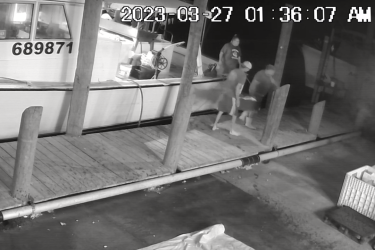Offshore fishing charters in the Southeast are a great way to experience the outdoors. As with any business, there are those who follow the rules and a few who do not. Properly licensed charter captains incur expenses related to permits, safety gear, and other operational costs. This ensures they comply with regulations and that their customers are given a legal, safe, and sustainable experience. NOAA’s Office of Law Enforcement (OLE) continues to make investigating illegal charters a high priority in the Southeast through increased patrols and targeted enforcement operations.
“Tips routinely come into our enforcement hotline reporting illegal charter fishing operations,” said Manny Antonaras, Assistant Director of OLE, Southeast Division. “Illegal charter operations are very concerning to us because they affect legally permitted fishing operations and fair market prices. They can also put customers’ safety at risk, or encourage them to lie about their relationship with the captain.”
OLE uses a multi-faceted approach to curb illegal charter activity. This includes public outreach at Fishery Management Council meetings, engagement with stakeholders, and increased patrol presence on the water. With the help of state enforcement partners and the U.S. Coast Guard, enforcement patrols continue throughout the region.
Do Your Part When You Book a Trip
NOAA advises the public to ask some important questions before booking a trip.
1. Does the captain/owner hold a valid captain’s license?
2. Do they possess the required permits to fish in federal waters?
3. Do they have a safety plan? If so, request to see the safety equipment on board.
Asking these questions ahead of time will keep people from unintentionally booking an illegal charter.
Understanding Federal Permits and Legal Charters
Federal charter/headboat permits are prevalent in the South Atlantic and Gulf of Mexico—with more than 1,300 Gulf of Mexico Limited Permit Holders fishing from Texas to the Florida Keys. Permits for Gulf of Mexico Charter/Headboat for Reef Fish and Coastal Migratory Pelagics are significantly more difficult to obtain than the open access permits allowed in the South Atlantic area. But, illegal operators exist throughout the Southeast region. The Southeast Regional Office maintains information about charter permit types and which vessels hold federal charter permits.
Learn more about current federal fishing permit holders
OLE works hard to protect properly licensed charter captains and owners from those willing to break the rules. “I’m blessed to have an established charter business, but one of my biggest worries is that illegal operators cut corners and take shortcuts when fishing and will endanger the safety of others through poor decisions that a properly licensed captain would not make,” said Dylan Hubbard, captain and owner of Florida-based Hubbard’s Marina. “Illegal charters reflect poorly on the whole industry and put a huge burden on upstart captains competing in an over saturated market of legal operators.”
Beyond concerns about customer safety that stem from illegal charters, captains stress the costs that are associated with running a legal business. “The largest cost is the federal permit (limited access) and time to keep up on safety drills and our drug and alcohol consortium requirements,” said Captain Hubbard. Captains also cite the amount of time and money invested in proper safety and conservation equipment for turtle mitigation gear, descender devices, and safety equipment like life rafts. Lastly, legal outfits incur higher costs associated with newly enacted monitoring equipment that aids in fishery stock assessments, and through non-required actions like carrying extra liability insurance or performing drills beyond U.S. Coast Guard standards.
OLE’s targeted patrols and enforcement, coupled with continued dialogue with the public and vested stakeholders, help increase compliance among anglers by making them aware of the regulations and deterring illegal activity. In addition, these efforts benefit conservation and protect our nation’s marine life.
NOAA and the regional fishery management councils may also implement future preventative measures as the public and industry continue to report illegal charter fishing activity. Newly implemented measures such as the Southeast For-Hire Electronic Reporting Program requirements provide more accurate and reliable fisheries information on more than 3,000 charter vessels in the Gulf of Mexico and South Atlantic.
For-hire compliance requirements
Before customers decide to head offshore and try their luck, they should remember some of these useful tips and resources to ensure they will be going on a safe, legal and enjoyable trip. If you witness a violation, you can contact NOAA’s Enforcement Hotline at (800) 853-1964. Tips may be left anonymously.



